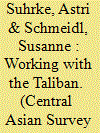| Srl | Item |
| 1 |
ID:
090443


|
|
|
|
|
| Publication |
2009.
|
| Summary/Abstract |
Despite the ousting of the Taliban and a subsequent peace agreement reached at the end of 2001, Afghanistan continues to struggle with insecurity. The existing security deficit of the Afghan state is currently filled by a wide array of (armed) non-state actors (ANSA). Even though much of the Afghan experience with ANSA has been negative, the inability of the state to provide comprehensive security necessitates a consideration of alternatives. One of such possible alternative, the community-based policing structure in south-eastern Afghanistan (arbakai) is explored in this article. We conclude that it is important to understand the context-specificity of ANSA before promoting overarching policies such as advocating a transferability of the arbakai outside their unique cultural and regional context. We also caution against the use ANSA beyond their capacities, such as for counter-insurgency purposes and formalize engagement with clear parameters to ensure accountability.
|
|
|
|
|
|
|
|
|
|
|
|
|
|
|
|
| 2 |
ID:
192973


|
|
|
|
|
| Summary/Abstract |
Nearly two years after the Taliban seized power in Kabul, in August 2021, the international aid community continued to search for workable approaches to deal with the new situation. Afghanistan’s deepening economic and humanitarian crisis called for major assistance, but the relationship between major donors and the Taliban de facto authorities had settled into a deeply adversarial mode. It resembled in many respects the relationship between the international aid community and the Taliban during the first Emirate (1996–2001). The story of that limited and difficult interaction – mostly consisting of humanitarian aid in a process that swung between confrontation and creative, though modest, compromises – is worth recalling for the insights it holds for the present. This article examines the patterns of that interaction, the results on the ground and the implications for the Western relationship with the present Taliban Emirate.
|
|
|
|
|
|
|
|
|
|
|
|
|
|
|
|